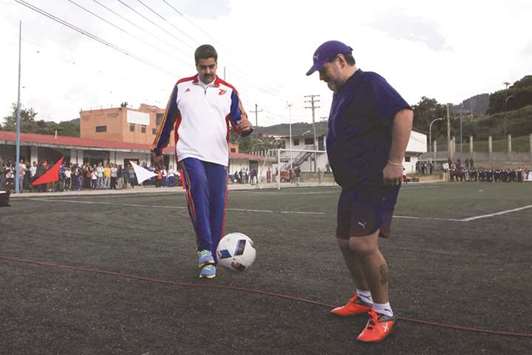The European Union is set to impose an arms embargo on Venezuela and will consider further sanctions in response to the political crisis in the South American country, two EU diplomats said.
The measures will bring the EU more into line with the US, which imposed sanctions earlier this year, and they signal a change of tone in Brussels, which had previously resisted taking a tougher approach towards Caracas.
“The steps were approved yesterday, paving the way for approval (by the bloc’s foreign ministers) next Monday,” an EU diplomat said, adding that the ministers’ backing was a formality.
Spain has long pushed for sanctions on those close to President Nicolas Maduro, whom Washington accuses of installing a dictatorship, but the EU has been divided over whom to target, while Britain is a significant arms supplier to Venezuela.
Diplomats said the turning point for EU governments was regional elections that appeared to favour Maduro’s ruling Socialists last month.
Polls had suggested the opposition would easily win a majority but in the end it won only a handful of governorships, according to the pro-government electoral board.
However, the decisions taken by EU ambassadors at a meeting yesterday only prepare the legal basis for sanctions, without any names.
Travel bans and asset freezes would only be imposed on Venezuelan officials “should the evolution of the situation require it”, a second EU diplomat said.
Once approved, the arms embargo will be accompanied by a ban on exports of equipment that could be used for internal repression and of surveillance equipment, the diplomats said.
Meanwhile, the UN Security Council is to hold an informal meeting on Monday called by the US to discuss the deepening crisis in Venezuela, diplomats said.
The council will hear from Luis Almagro, the secretary-general of the Organisation of American States (OAS) and an outspoken critic of President Nicolas Maduro’s government.
Argentinian Foreign Minister Jorge Faurie confirmed the planned council meeting to journalists in New York.
Faurie, who was accompanying President Mauricio Macri, said there was major health and food emergency in Venezuela that the United Nations must address.
“Venezuela at the start was a worry to us. Now it’s painful,” said Macri, who discussed the crisis with UN secretary-general Antonio Guterres at UN headquarters.
“We need to find ways to ensure that free and transparent elections can happen in Venezuela,” said Faurie. “What we have today in Venezuela is a state of non-democracy with many violations of human rights and political rights.”
Venezuelan lawmaker Freddy Guevara sought refuge at Chile’s embassy in Caracas on Saturday, a day after the pro-government Supreme Court stripped him of his immunity and said he would be prosecuted on charges punishable by a decade in prison.
US Ambassador Nikki Haley has called on the council to turn its attention to Venezuela after leading a closed-door meeting of the top UN body on the crisis in May.

Venezuela’s President Nicolas Maduro attends a soccer practice with Argentina soccer legend Diego Maradona in Caracas, Venezuela.
